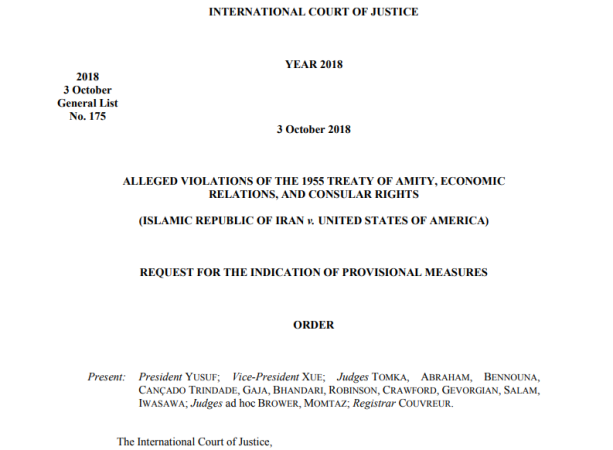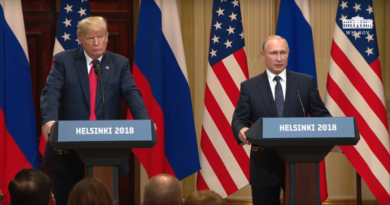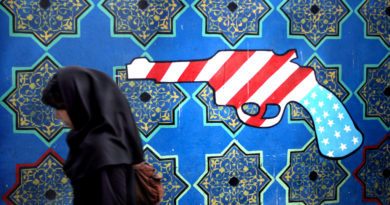ICJ Rules for Iran Against U.S., Pompeo Announces Termination of Treaty of Amity
ICJ Ruling in Iran v. United States
On Wednesday, the International Court of Justice (ICJ), ordered the Trump administration to ease U.S. sanctions on Iran that impede U.S. medical, agricultural and civil aviation related exports to the Islamic State as a result of Trump’s announced withdrawal from the Joint Comprehensive Plan of Action (JCPOA) earlier this year. The JCPOA is an agreement between Iran and the five permanent members of the U.N. Security Council, including the United States, plus Germany and the European Union in which Iran agreed to certain conditions regarding its nuclear program in exchange for the easing of sanctions by the other party states.
In [the Court’s] opinion, the measures adopted by the United States have the potential to endanger civil aviation safety in Iran and the lives of its users… The Court further considers that restrictions on the importation and purchase of goods required for humanitarian needs, such as foodstuffs and medicines, including life-saving medicines, treatment for chronic disease or preventive care, and medical equipment may have a serious detrimental impact on the health and lives of individuals on the territory of Iran.
The ICJ’s order is not the end of the litigation in this case. Rather it is the result of Iran’s request to the court for an “indication of provisional measures” while the main case is pending. This is basically the equivalent of an injunction that can be ordered by an American court in a civil suit. The ICJ stated it imposed the order to prevent harm to the Iranian people that may result from a lack of access to the types of U.S. exports listed above. The main case, Alleged Violations of the 1955 Treaty of Amity, Economic Relations, and Consular Rights (Islamic Republic of Iran v. United States of America), has broader implications and may drag on for years.
Although the U.S. argued that existing exceptions, authorizations, and licensing policies for humanitarian-related transactions and safety of flight will remain in effect, thus avoiding any harm to Iranians, the argument failed to allay the court’s concerns in light of the “ongoing” nature of the situation, as well as another set of scheduled sanctions to be imposed by the U.S. beginning November 4th. .
Pompeo Announces Termination of Treaty of Amity
The International Court of Justice was established by the U.N. Charter in 1945. The Court has binding authority over legal disputes submitted to it by national governments. But, in reality, it has no way of actually enforcing an order or judgment against any party to a dispute. Furthermore, both Iran and the United States have ignored the ICJ’s authority before and the U.S. wasted little time in snubbing the court’s order. Predictably, U.S. Secretary of State, Michael Pompeo, announced the United States was terminating the 1955 Treaty of Amity, Economic Relations, and Consular Rights between the United States and Iran within hours of the ICJ issuing its order.
Given Iran’s history of terrorism, ballistic missile activity, and other malign behaviors, Iran’s claims under the treaty are absurd.
The court’s ruling today was a defeat for Iran. – Michael Pompeo, U.S. Secretary of State
Of course, in his press briefing, the U.S. Secretary of State could not waste an opportunity to, once again, paint Iran as a world menace and sponsor of terrorism. He even tried to spin the ruling as a loss for Iran. Pompeo stated, “Given Iran’s history of terrorism, ballistic missile activity, and other malign behaviors, Iran’s claims under the treaty are absurd. The court’s ruling today was a defeat for Iran.” While the ICJ did agree that the United States’ restriction of Iran’s access to nuclear related exports from the U.S. may be legitimate in the interests of U.S. national security, this hardly a “defeat for Iran.”
The 1955 Treaty of Amity and Never-ending War in the Middle East
The 1955 Treaty of Amity, Economic Relations, and Consular Rights between the United States and Iran is the basis under which Iran has brought the litigation before the ICJ. The treaty contains rules facilitating commerce and trade between the two states, including specific rules prohibiting restrictions on the import and export of products originating from the two countries. The treaty also contains rules relating to the payment and transfer of funds between them. The Court viewed the U.S. sanctions as violating these provisions of the treaty. But, of course, this wouldn’t be the first time a nation has violated the terms of a treaty.
The tone of Pompeo’s remarks are the continuation of an ongoing campaign by the Trump Administration to demonize Iran in an eventual march to war with the Islamic state. A campaign that completely ignores the United States’ disgraceful history with Iran and the greater Middle East. A campaign that is part of a larger plan, exposed by General Wesley Clark over a decade ago, that is being implemented by Washington beltway neocons to destabilize and destroy the Middle East.
Links to resources, including General Wesley Clark’s comments on the neocon plan to take out seven Middle Eastern countries, are below.
The Political New Report was created in the interests of informing the public and we need your help. Please share this article and website on social media, and also like and subscribe so other like-minded people can find this content.
Resource Links:
- Order of 3 October 2018, Request for the indication of provisional measures, International Court of Justice, October 3, 2018
- Remarks by the Secretary of State [Press release], U.S. Department of State, October 3, 2018
- “Seven countries in five years”, Salon.com, October 12, 2007
Related:
- Five Quick Facts About Iran That the U.S. Wants You to Ignore, January 3, 2018
- IAEA Chief Says Iran in Compliance With JCPOA, March 5, 2018
- Trump Announces Withdrawal from Iran Deal, May 8, 2018
- Pompeo Unveils a “New” Iran Strategy, May 22, 2018




